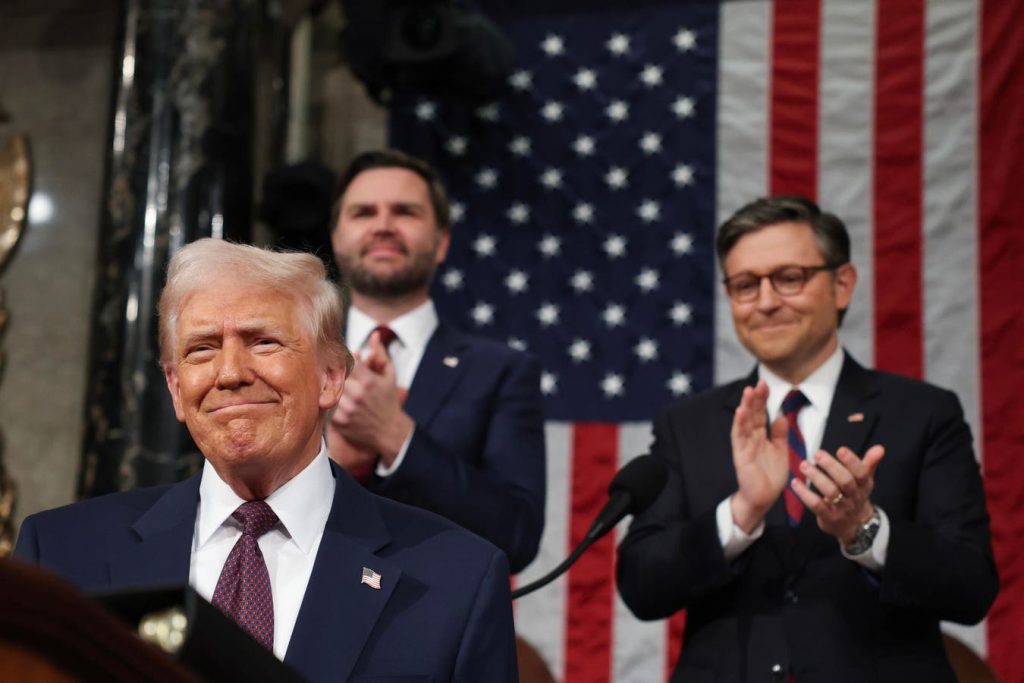WASHINGTON, DC – MARCH 04: U.S. President Donald Trump addresses a joint session of Congress. … [+]
Can doing nothing grow the economy by trillions of dollars over the next decade? Congressional Republicans may be on the road to making that extraordinary assumption. In effect, Congress may choose to assume, simultaneously, that extending the expiring provisions of the Tax Cuts and Jobs Act does not change tax policy and that, even though nothing is changing, it would substantially increase economic growth.
House Speaker Mike Johnson (R-La.) seems to be warming to a Senate Republican plan to build a budget that assumes key provisions of the TCJA already are permanent, even though they are due to expire at the end of this year. This “current policy baseline” is at odds with how budget bills — including TCJA — are scored. However, it would make it possible to avoid having to pay for extending those tax cuts, at least on paper, though Congress also would have to finance additional tax cuts proposed by President Trump during his 2024 campaign.
The Senate baseline wouldn’t reduce by a dime the $4.5 trillion cost of extending the expiring TCJA provisions. While it can make the tab disappear for budget accounting purposes, any tax cuts still would have to be paid for with offsetting tax increases, spending cuts, or more borrowing.
Johnson’s Problem
But Johnson has a problem: The budget framework already passed by the House relies on a different assumption: It acknowledges that a big chunk of the TCJA will indeed expire at the end of this year (a current law baseline, in budget-speak) and makes room for about $4.5 trillion in unspecified tax cuts to extend them. The House Ways & Means Committee is expected to begin detailing those tax provisions in a week or two.
But to partially offset the cost, the House makes a different, highly controversial assumption: Extending the TCJA, improving government efficiency, and adopting unspecified changes to federal regulations would raise $2.6 trillion over the next 10 years by boosting economic growth.
That assumption, combined with the Senate’s current policy baseline, could be enough to fund both a TCJA extension and some of Trump’s tax cut plan, all of which could cost as much as $11 trillion.
Tax Cuts And Growth
Extending the TCJA, and borrowing to pay for it, would boost the economy, but not by much. For example, TPC estimates that economic growth would reduce the costs of extending the TCJA by about $220 billion over a decade, less than one-tenth of the House’s assumption. TPC’s analysis is roughly consistent with other independent forecasts.
So far, the Senate has excluded tax cuts entirely from its budget resolution. But when the two chambers put together a final budget package later this year, they could agree to somehow combine the two gimmicks: both the Senate baseline that assumes no change at all in tax policy and the House bill that assumes a big policy change that leads to substantial economic growth.
No Economic Sense
But such a mash-up would make no economic sense. Lawmakers would be arguing that the tax bill is merely extending current tax policy and that this non-event would contribute to a big increase in the economy.
Granted, the House GOP claims growth could come from factors other than extending the TCJA. But its budget framework says nothing about how government would be made more efficient or what regulations would be cut. Without knowing these details, it is impossible to credibly forecast how unspecified changes would affect the economy; or even know whether they would be beneficial or harmful.
For example, cutting red tape that inhibits business creation could expand the economy. But other actions, such as substantial cuts to the National Weather Service staff made by the Trump administration could slow economic growth by damaging the government’s ability to predict hurricanes and help businesses to prepare for them.
We may not know for many months how Congress chooses to play the baseline and growth game. But we do know this: Pretending that extending the TCJA has no budgetary cost is not credible. Asserting that any cost could be substantially offset by economic growth is equally incredible. Assuming that both can simultaneously be true would be simply astonishing.

